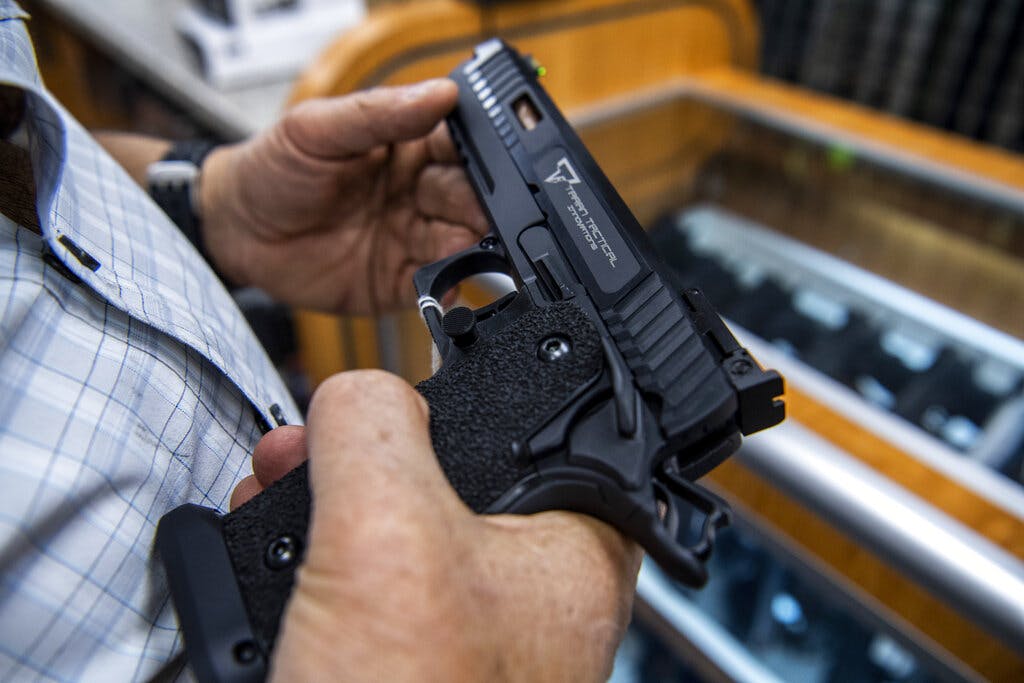Legal Protections for Gunmakers Likely To Be Scrutinized by Supreme Court Amid Dispute Over Garden State ‘Nuisance’ Law
The question at hand for courts in the future is whether or not state statutes are superseded by a federal law that protects manufacturers from liability lawsuits.

A recent court decision from New Jersey raises the likelihood that the Supreme Court could rule in the future on the constitutionality of broad federal liability protection for firearms manufacturers.
Last week, three judges of the Third Circuit of the United States Court of Appeals ruled that the Garden State’s “public nuisance” law, which permits citizens to sue gun manufacturers for damages, can take effect. The judges found that the organization that brought the lawsuit, the National Shooting Sports Foundation, lacked standing to bring the case.
The law states that gun manufacturers who “knowingly or recklessly create, maintain, or contribute to a public nuisance in this State through the sale, manufacturing, distribution, importing, or marketing of a gun-related product” can be sued in civil court by state and local governments, as well as private citizens.
The question at hand for courts in the future is whether or not state statutes are superseded by a federal law that protects manufacturers from liability lawsuits — the Protection of Lawful Commerce in Arms Act.
Passed in 2005, the law shields firearms manufacturers from liability lawsuits brought by those who have suffered at the hands of a criminal using the manufacturer’s product. Many states, including New York, California, Delaware, and Colorado have adopted laws similar to New Jersey’s that allow citizens to sue members of the firearms industry.
The judges of the Third Circuit wrote in their opinion that those who brought the lawsuit challenging the “public nuisance” law, the National Shooting Sports Foundation, lacked standing to bring the case. Previously, a federal district court judge at New Jersey, Nahid Quarashi, who was nominated to the bench by President Biden, temporarily blocked the state law from taking effect because he had concerns it violated the federal liability shield law.
“Because the Foundation’s case is not yet fully formed, we will vacate the preliminary injunction and remand with instructions to dismiss this action for lack of jurisdiction,” the three judges of the Third Circuit wrote in their opinion.
In a statement, the general counsel for the NSSF, Lawrence Keane, said the New Jersey law “certainly” violates the federal liability law. “Should New Jersey’s attorney general attempt to enforce the law, we will immediately refile our complaint,” Mr. Keane wrote.
The case will now be returned to Judge Quarashi’s chambers, where he will rule on the merits of the law. No matter the outcome, it is likely that whoever loses the case, be it the NSSF or the defendant, state attorney general Matthew Platkin, will appeal to the Third Circuit again.
Once a decision is made by those jurists, the decision is likely be appealed again to the justices of the Supreme Court. Previously, the justices have allowed such liability lawsuits to take place. In 2019, the Supreme Court declined to hear an appeal from a gun manufacturer, Remington, that had been found liable for contributing to the 2012 Sandy Hook Elementary School shooting.
The shooter, Adam Lanza, had used a Bushmaster rifle — which was manufactured by Remington — to commit the crime. Parents of the victims sued the company saying that their marketing practices contributed to Lanza’s action. Remington filed for bankruptcy less than a year later.
The likelihood that the Supreme Court could take the case in either the next court term or the one after that is bolstered by the fact that there is great confusion among judges across the country about how to implement the court’s new standards of interpreting firearms regulations.
A landmark court decision last year, New York Pistol and Rifle Association v. Bruen, set forth a new standard for federal judges to evaluate firearm regulations. For such restrictions to be legal, they must be “consistent with the Second Amendment’s text and historical understanding.” What that means, however, has befuddled many jurists.
One judge, Carlton Reeves of Mississippi, openly vented his frustrations during a court hearing earlier this year in which he questioned whether or not he should appoint a historian to aid him in interpreting the “historical understanding” of firearms law. He also said the justices were asking lower court judges to “play historian.”
Major cases have been borne of Bruen since it was decided in June 2022. Judge Reeves — while noting in his decision that he finds the current Supreme Court precedent dissatisfying — struck down the federal prohibition on felons owning firearms.
Another case, this one from the Fifth Circuit Court of Appeals, declared impermissible the federal ban on those under restraining order from owning guns. United States v. Rahimi — an appeal of which will be heard by the Supreme Court this coming term — was a case levied against a Texas man, Zackey Rahimi, who was convicted of possessing a firearm while under a restraining order from his former girlfriend.
The judges of the Fifth Circuit unanimously held the the prohibition violated the Second Amendment under the standard set forth in Bruen. In his concurring opinion, Judge James Ho wrote that “those who commit or criminally threaten domestic violence have already demonstrated an utter lack of respect for the rights of others and the rule of law. So merely enacting laws that tell them to disarm is a woefully inadequate solution. Abusers must be detained, prosecuted, and incarcerated. And that’s what the criminal justice system is for.”
Judge Ho also said, however, that those prosecutions must be made without “offending” others’ Second Amendment rights.

